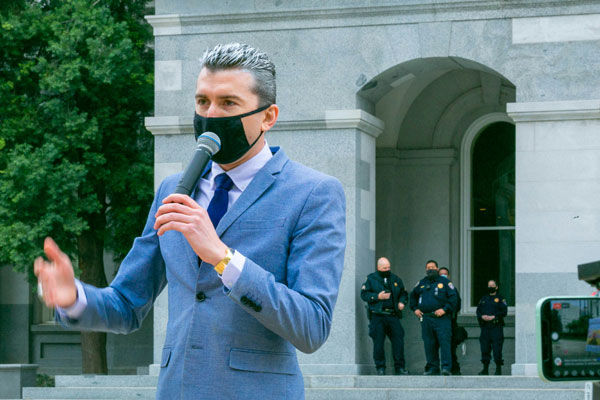Trump deploys federal troops to California despite Governor Newsom’s opposition

[A photo of Gavin Newsom. Photo credit to Unsplash]
On June 9th, 2025, a political battle erupted between President Donald Trump and California Governor Gavin Newsom following the president’s decision to deploy over 2,000 National Guard and Marine troops to the state without state permission.
This deployment was ordered to support federal immigration enforcement in the midst of growing protests against the deportation of undocumented immigrants.
However, Trump’s decision invoked immediate intervention from Newsom and the Californian government, which took swift legal action in response.
The incident began when Trump activated California’s National Guard for duty using Title 10 of the U.S. code, bypassing the governor’s command over state military officers.
The official reason for activating the Guard was stated to be assisting Immigrations and Customs Enforcement (ICE) in mass raids and deportations against undocumented immigrants in Los Angeles.
Trump’s administration claimed that the protests were an "orchestrated attack," with Trump himself describing them as "violent, insurrectionist mobs."
In a press conference following the deployment, Governor Newsom classified the move as illegal and authoritarian.
He announced that the state of California, along with Attorney General Rob Bonta, planned to sue the Trump administration.
He argued that the deployment of the National Guard to California without state consent violated constitutional law and that the case would be tried in federal court.
The official lawsuit documents claimed that the federal government misused Title 10 to federalize the National Guard without just cause.
Experts state that while the president does have the authority to federalize state forces under certain circumstances, such as during an insurgency, invasion, or national emergency, the Newsom lawsuit argues that none of these conditions apply to the current situation.
In an interview with reporters at Morristown Municipal Airport, Trump characterized Newsom as “grossly incompetent.”
When asked about his thoughts on arresting the governor, he said, “I’d do it if I were [border czar Tom Homan]. I think it’s great.”
The White House clarified afterward that there were no plans at the time to arrest Newsom; however, the statement itself was enough to provoke a reaction from state leaders, who characterized Trump’s actions as tyrannical and unlawful.
Historically, very few presidents have ever deployed military personnel on state territory over the objection of its governor, and experts warn that the situation may set a dangerous precedent if not stopped by the courts.
Aside from the legal implications of this event, the political ramifications are undeniable.
Gavin Newsom, who is rumored to be considering a bid for the 2028 presidential election for the Democratic Party, has positioned himself as direct opposition to Trump and his second- term plans.
The conflict is likely to spark further tensions between the Republican and Democratic parties and possibly worsen the nation’s current political climate.
The dispute also raises questions about the balance of federal and state authority, particularly regarding immigration enforcement and the use of military forces within state borders. Currently, the case is scheduled to begin with a preliminary injunction hearing near the end of June, but until the lawsuit is settled, National Guard troops remain stationed in Los Angeles against the orders of the state government.

- Ian Kim / Grade 9 Session 3
- R.E. Mountain Secondary School

![THE HERALD STUDENT REPORTERS [US]](/assets/images/logo_student_us.png)
![THE HERALD STUDENT REPORTERS [Canada]](/assets/images/logo_student_ca.png)
